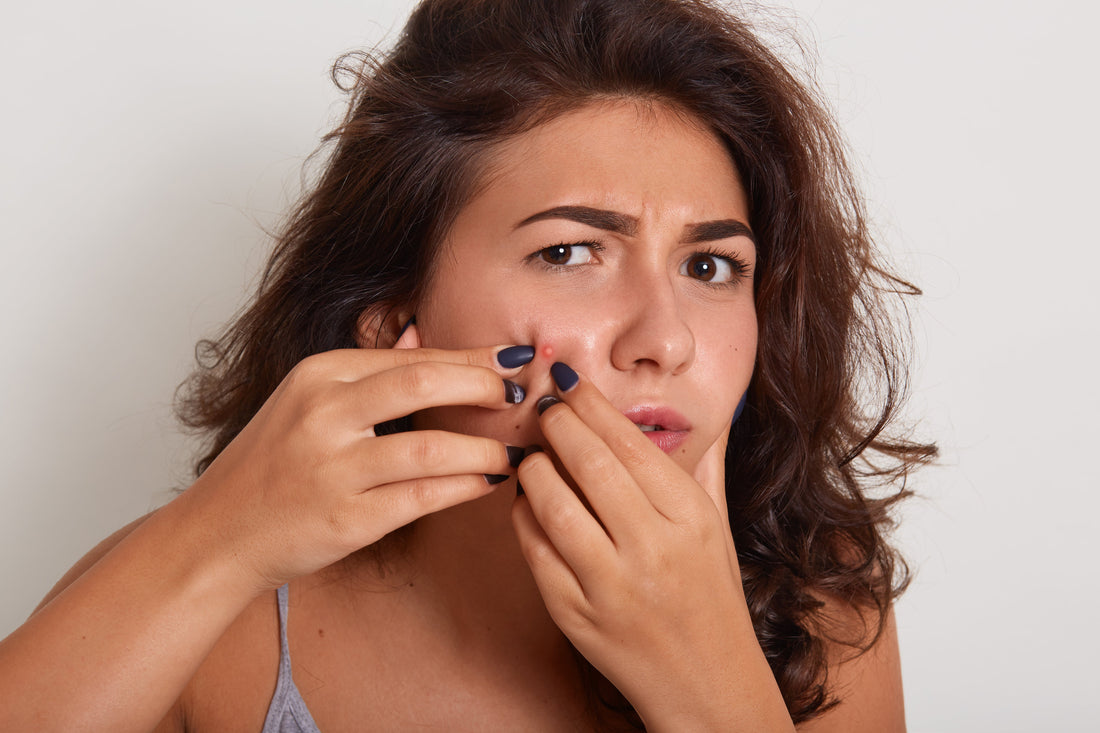
Understanding and Managing Acne
Share
Acne is a common skin condition that affects between 50-80% of teenagers and young adults. It's a disorder involving the pilosebaceous unit, which includes the hair follicle and its associated oil gland. Several factors contribute to its formation: increased sebum (an oily substance protecting the skin), build-up of material in the hair follicle, increased levels of the bacteria Cutibacterium acnes (commonly found on the skin), and inflammation.
Acne can appear in different ways:
- Comedonal: Whiteheads and blackheads.
- Inflammatory: Red bumps.
- Nodular: Large, painful cysts.
How Does Acne Develop?
The process often begins with hormones signaling oil glands to increase sebum production. A plug made of sebum and keratin (a protein in skin, hair, and nails) forms, blocking the hair follicle opening and creating whiteheads and blackheads. This increased sebum allows for higher concentrations of P. acnes (also referred to as C. acnes in the source). This leads to further blockage and increased inflammation. In some cases, the hair follicle can rupture, resulting in those painful nodules. Insulin also plays a role, increasing oil gland activity directly and indirectly by boosting levels of hormones like insulin-like growth factor and androgens.
Finding the Right Treatment Plan
Choosing a treatment plan involves considering several factors:
- The type and severity of acne.
- Whether there is scarring.
- What treatments have been tried previously.
- The psychological impact of acne.
- For girls and women, information about menstrual history and signs of hormonal abnormalities (like excessive facial hair or insulin resistance) can be helpful.
While pharmacologic treatments are available, this document focuses on integrative approaches.
Gentle Skin Care Practices
Adhering to gentle skin care is a crucial first step.
- Gently rinse skin with warm water once or twice daily.
- Avoid washcloths or other abrasive materials.
- Use only gentle, nonsoap-based cleansers, as detergent-based soaps, toners, and astringents can dry and irritate the skin. Although these remove surface oil, they don't reduce sebum production and can actually signal the skin to make more oil.
- If using moisturizers or cosmetics, ensure they are not oil-based and are labeled noncomedogenic.
It can be tempting to pick or squeeze acne lesions. While offering immediate relief, this slows down healing, causes tissue injury, increases inflammation, and can lead to scarring that is often difficult or impossible to reverse.
The Impact of Diet on Acne
Making healthy dietary choices can support overall health and may improve acne, which is an inflammatory condition.
- Anti-inflammatory or Mediterranean-style diets are recommended.
- Low glycemic index/low glycemic load diets have shown improvement in acne in clinical trials.
- Avoiding or limiting all forms of dairy may be beneficial, potentially due to stimulating insulin-like growth factor levels.
- Limiting foods high in added hormones (like meat and dairy) might also help by potentially altering hormonal balances and overstimulating oil glands.
- Increasing plant intake can be helpful. Plants provide prebiotics that feed the gut microbiome, which is important for health, including acne. Diets rich in plants may also help by modulating hormones, normalizing blood sugar and insulin sensitivity, and offering anti-inflammatory benefits.
Prevention Strategies
Based on the source, here are some tips for preventing acne or managing flares:
- Take gentle care of your skin.
- Eat a plant-rich, low glycemic index/low glycemic load diet with foods rich in omega-3 fatty acids (salmon, nuts, flax).
- Consider a probiotic with at least 10 billion CFU and a mix of Lactobacilli and Bifidobacterium species.
- Avoid dairy and meat from animals treated with exogenous hormones.
- Consider an omega-3 supplement.
- Consider a good-quality multivitamin with appropriate doses of zinc, vitamin A, and vitamin E.
- Learn about stress management techniques.
- Avoid picking or squeezing acne lesions.
Remember, managing acne often involves a multifaceted approach, considering gentle skin care, diet, potential supplements, and addressing the emotional impact.
